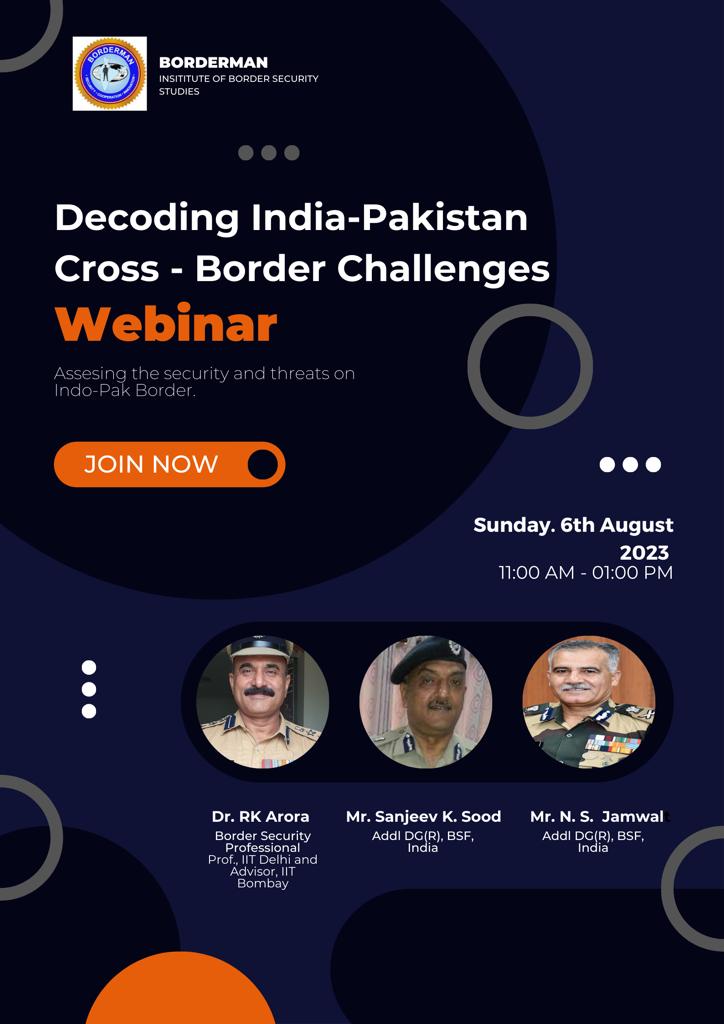Decoding the India-Pakistan Cross Border Challenges: A Webinar Report

The seminar titled “Decoding the India-Pakistan Cross Border Challenges” brought together esteemed experts in the field to analyse and discuss the multifaceted challenges posed by the volatile India-Pakistan border situation. The event provided a platform for in-depth insights into the complexities of border security, diplomatic intricacies, and strategies to manage the cross-border challenges. The event was graced by esteemed panellists, including Dr. R K Arora, a renowned Border Security Professional and Professor at IIT Delhi; Mr. Sanjeev K Sood, Additional Director General (Retd.) of the Border Security Force (BSF) India; and Mr. N.S. Jamwal, Additional Director General (Retd.) of the Border Security Force, India. The seminar aimed to shed light on the historical context, current challenges, and potential solutions pertaining to this complex geopolitical issue.

Dr. R K Arora: Border Security Dynamics and Technological Advancements
Dr. Arora stressed the importance of adopting a holistic approach that combines both traditional and modern strategies for effective border management. Furthermore, Dr. Arora highlighted the role of technology in addressing cross-border challenges. He discussed the significance of surveillance systems, drone technology, and data analytics in enhancing situational awareness and response capabilities and also emphasized that the emergence of cyber threats, including the presence of sleeper cells, presents a significant challenge to national security. Vigilance in cyberspace is critical as well as how technology has become a double-edged sword, both empowering security forces and providing new avenues for threat actors.. He also emphasized the role of academia and research institutions in collaborating with security agencies to develop innovative solutions. He highlighted the evolving threat of drones in border areas, underscoring the need for advanced anti-drone technologies and coordinated defence strategies.
Mr. Sanjeev K Sood: Diplomatic Dimensions and Conflict Resolution
Mr. Sanjeev K Sood, a former Additional Director General of the Border Security Force, commenced the seminar by shedding light on the ever-evolving landscape of border security challenges. He emphasized the need to understand the historical context and socio-political factors that contribute to the complexities of the India-Pakistan border. offered valuable insights into the diplomatic intricacies of the India-Pakistan relationship. He stressed that a deep understanding of the historical context is essential to resolving the India-Pakistan border dispute. Historical grievances and the legacy of partition continue to shape perceptions and actions. The panelists discussed how the abrogation of Article 370 had significant ramifications, both domestically and internationally. It was noted that this decision has shaped the security landscape in the region.
He delved into the historical roots of the conflict and discussed the importance of open channels of communication to prevent escalation of tensions. Mr. Sood stressed the need for sustained dialogue, confidence-building measures, and the role of international organizations in facilitating conflict resolution. The discussion on terrorism in Kashmir emphasized the need for a comprehensive approach that addresses not only security concerns but also the underlying socio-economic and political issues fuelling militancy.
Mr. N.S. Jamwal: Border Management Strategies and Lessons Learned
Mr. N.S. Jamwal, another distinguished panellist and former Additional Director General of the Border Security Force, shared his insights into border management strategies. Highlighting the role of border security forces, Mr. Jamwal discussed the challenges faced by personnel operating in high-stress environments. He underscored the significance of psychological training, cross-cultural awareness, and empathy in effectively managing tense situations at the border. He agreed on the importance of responsible reporting in shaping public opinion and international perspectives. Biased or sensationalized reporting can exacerbate tensions.
He discussed the importance of intelligence-sharing and coordination among various agencies to counter transnational threats effectively. Drawing from his experiences, Mr. Jamwal outlined successful instances of community engagement programs that fostered goodwill among border communities, contributing to improved security measures.
Additionally, Mr. Jamwal touched upon the challenges posed by cross-border smuggling, human trafficking, and terrorism. He emphasized the significance of comprehensive policies that address economic disparities and social issues in border areas, reducing the vulnerabilities that perpetrators often exploit.
The seminar on “Decoding the India-Pakistan Cross Border Challenges” provided a platform for an enriching exchange of ideas among experts and participants. The insights shared by Dr. R K Arora, Mr. Sanjeev K Sood, and Mr. N.S. Jamwal shed light on the multifaceted nature of the border challenges and underscored the need for a comprehensive approach that encompasses diplomacy, technology, community engagement, and strategic planning. As India and Pakistan continue to grapple with border tensions, the knowledge shared in this seminar serves as a crucial resource for policymakers, security personnel, and academics alike. It is hoped that the insights and recommendations presented during the event will contribute to the development of effective strategies for maintaining peace and stability in this historically significant region. It offered valuable insights into historical, technological, and security aspects, contributing to a better understanding of this complex and long-standing conflict. The event highlighted the need for a holistic and multidimensional approach to address the challenges posed by the India-Pakistan border and underscored the importance of responsible reporting and international cooperation in finding lasting solutions.
In an era where geopolitical stability is more critical than ever, forums like this seminar play a pivotal role in fostering dialogue, understanding, and cooperation among nations facing complex border challenges



Leave a Reply